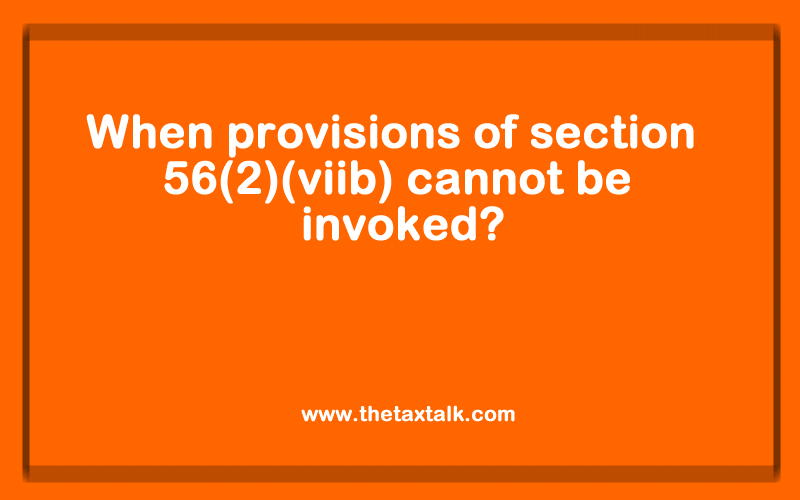![]()
When provisions of section 56(2)(viib) cannot be invoked?
Provisions of section 56(2)(viib) cannot be invoked in case of assessee-company because by virtue of cash being brought into assessee-company by ‘S’ for allotment of equity shares with unrealistic premium, benefit had only passed on to her daughter ‘V’ and there is no scope in Act to tax when cash or asset is transferred by a mother to her daughter
[2018] 98 taxmann.com 92 (Chennai – Trib.)
IN THE ITAT CHENNAI BENCH ‘A’
Vaani Estates (P.) Ltd.
v.
Income-tax Officer, Corporate Ward- 3 (4), Chennai*
[ASSESSMENT YEAR 2014-15]
AUGUST 27, 2018
HELD
■ Though ‘S’ had introduced cash into the assessee-company amounting to Rs.23.31 crores for allotment of shares at premium of Rs.23,096 per share when the intrinsic value of the share was only Rs.10 per share which is the face value of the shares, the benefit of such investment at an unrealistic share premium has only passed on to her daughter because they are only two shareholders in the assessee-company at that point of time. Had ‘S’ gifted the money to her daughter ‘V’ and thereafter if the daughter would have brought the same into the assessee-company for allotment of equity shares at face value, invoking of the provisions of section 56(2)(viib) would not have aroused. Further, as pointed out by the assessee, it is evident from the Finance Minister’s speech that the provisions of section 56(2)(viia) was introduced by the Finance Act 2012, only to curb generation and use of unaccounted money. In the absence of the provisions of section 56(2)(viia) & section 56(2)(viib), it was possible for any company either closely held or otherwise to introduce unaccounted money as investment in equity share of the company with inflated share premium through a deploy as investor. However in the case of the assessee-company, the investors’ source of investment is genuine and not in dispute. The only other lone shareholder of the assessee-company is their daughter who is the new entrant in the business of her parents with no scope of possessing undisclosed cash. From these facts, it is evident that in the case of the assessee-company, there is no possibility of generation and use of unaccounted money resulting from the transaction of infusing cash by ‘S’ into the assessee-company in the form of equity share premium. Moreover, when the whole transaction is viewed by lifting the corporate veil of the assessee-company, it was apparent that 24.88 per cent [‘S”s percentage of shareholding : 15100 (total number of shares held x 100 / 20,100 (Total number of shares allotted) = 75.12 per cent and ‘V”s percentage of shareholding : 5000 (total number of shares held) 100 / 20,100 (Total number of shares allotted) = 24.88 per cent] of the benefit arising out of the introduction of cash in the form of equity share with premium has reached from ‘S’ to ‘V’, i.e., from mother to daughter. Further, it is pertinent to mention that by virtue of the provisions of section 56(2)(vi) and (x) when gift is bestowed by mother to daughter, it is not taxable. Thus in the case of the assessee, when the provisions of section 56(2)(vi), (viib) and (x), are interpreted in a harmonious manner lifting the corporate veil of the assessee-company, it is abundantly clear that the provisions of section 56(2)(viib), has no implication in the case of the assessee-company, more-so keeping in view of the speech delivered by the Finance Minister. It is also pertinent to mention that in the instant case the benefit of infusing cash into the assessee-company by way of equity share with premium by ‘S’ will not benefit any other shareholders inducted in the company in future because in such event the shares will have to be allotted on the basis of the intrinsic value of the shares of the assessee-company otherwise at that point of time the provisions of section 56(2)(viib) will be instantly attracted. [Para 7.2]
■ It should be also kept in mind that provisions of section 56(2)(viib) creates a deeming fiction and while giving effect to such legal fictions all facts and circumstances incidental thereto and inevitable corollaries thereof have to be assumed.
■ Further it is apparent from the Finance Minister’s speech that the provisions of section 56(2)(viib) has been enacted to deter the generation and use of unaccounted money.
■ Even when there are transfer of shares physically, in the event of family arrangements, the High Courts have held that the entire transactions has to be viewed lifting the corporate veil and treat the transaction as if there is no transfer of shares and hence capital gain tax is not attracted. Similarly, in the case of the assessee-company also the corporate veil is required to be lifted and thereafter the transaction has to be viewed in the light of the relevant provisions of the Act. [Para 7.3]
■ Provisions of section 56(2)(viib) cannot be invoked in the case of the assessee-company because by virtue of cash being brought into the assessee-company by ‘S’ for allotment of equity shares with unrealistic premium the benefit has only passed on to her daughter ‘V’ and there is no scope in the Act to tax when cash or asset is transferred by a mother to her daughter. Hence, the Assessing Officer is directed to delete the addition made by invoking the provisions of section 56(2)(viib) in the case of the assessee-company. [Para 7.4]

